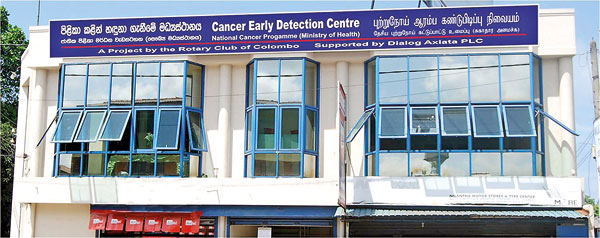Free screening centre that can help in early detection of cancer
View(s):A project, set up in collaboration with the Rotary Club of Colombo and the Health Ministry marks 15 years
Each year 15- 20,000 new cases of cancer are detected in Sri Lanka, of which over 50% are females. Cancer accounts for the second highest number of deaths from Non Communicable Diseases despite the fact that breast, cervical and oral cancer are preventable and effectively curable if detected early.

The Cancer Prevention and Early Detection Centre: Screening, diagnosis and referral, all under one roof
Whilst one third of cancers can be prevented, a further one third can be successfully treated with screening and early detection, thus emphasizing the vital importance of getting oneself screened early.
The National Cancer Prevention and Early Detection Centre set up by Rotary and run in partnership with the National Cancer Control Programme (NCCP) of the Ministry of Health is the only national facility, dedicated to screening, early detection and prevention of cancer offering its services entirely free of charge. Conveniently located in Narahenpita, at 516, Elvitigala Mawatha, the facilities of this walk- in clinic are available to any member of the public. Open five days of the week from 9 a.m. to 4 p.m. , the Centre offers screening and early detection with a focus on breast cancer, cervical cancer and oral cancer.
“Recognizing the critical need to prioritize and safeguard particularly women’s health, the Rotary Club of Colombo launched the Cancer Prevention and Early Detection Project 15 years ago, in the light of the rising incidence of cancers in women, namely breast cancer which accounts for over 25% of all cancers in Sri Lanka, and cervical cancer which now accounts for around 10% of all cancers,” said Rotarian Nirmali Samaratunga, Chairperson, Cancer Early Detection Project, Rotary Club of Colombo.
The Centre’s main services are consultation, screening, diagnosis, and follow up, counselling and referral to a treatment institute for cases diagnosed positive. These services are carried out by a team of dedicated doctors and nurses from NCCP, with the focus on breast cancer through mammography and ultrasound screening, this having the highest incidence of all cancers.
Screening for cervical cancer is carried out through HPV/DNA testing and Colposcopy diagnostic , and oral cancer through a dental screening unit at the Centre. A Health Education Unit handles the prevention activities such as building social awareness programmes and education for prevention of cancer.
A mobile screening operation is also carried out throughout the country.
The project has also reached out to the regions to make facilities for screening and early detection of cancer available to those communities, commencing with the setting up of a breast cancer screening unit at the Kurunegala Teaching Hospital.
The Rotary Club of Colombo this year entered into a MOU with the Ministry of Health to jointly collaborate in a far-reaching initiative islandwide, aimed at significantly reducing and in the future completely eliminating cervical cancer in Sri Lanka through a comprehensive programmme over the next 10 years of screening and early detection, training and public awareness.
Ms. Samaratunga stressed the vital importance of screening and early detection in saving lives otherwise lost to this killer disease due to late presentation. “With screening and early detection we could save several thousand lives every year. To date, the project has screened almost 70,000 persons, mainly women, with around 17000 cases showing signs requiring further investigation.”



